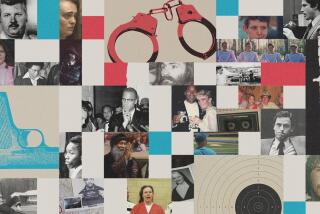TV Reviews : Public TV Looks at the Other Drug of Choice
- Share via
It’s widely considered “a menace to family life and the American character.” The Coast Guard tries to stop smugglers from bringing it in by boat. When huge shipments are confiscated, law-enforcement officials make a public display of destroying them. But, says one observer, “It doesn’t matter how many barrels are destroyed. There would always be more.” The ban on this substance makes gangs rich, and the corruption reaches all the way to the schoolyard.
America’s drug war of the late ‘80s? No. As the reference to “barrels” hints, it’s America’s war on liquor during the Roaring (and, despite the law, pouring) ‘20s that’s depicted in the lively “Demon Rum.” This is the second installment in the second season of the often-superb history series “The American Experience” (at 9 tonight on Channels 28 and 15).
In 1918, anticipating national Prohibition by two years, Detroit became the first major American city to “go dry.” In 1933, Michigan became the first state to vote for the repeal of the 18th Amendment. “Demon Rum” shows how just saying no to liquor didn’t work in Motown--or, for the same reasons, in the rest of the United States.
The hour looks at the era through the eyes of several Detroit-area oldsters who experienced it. These ex-factory workers, ex-flappers and ex-bootleggers recall how Henry Ford spurred the anti-alcohol movement, what it was like to attend a “speakeasy” or “blind pig,” and how easy it was to run liquor across the river from Canada. Well-chosen film clips--from newsreels, home movies, Ford propaganda--illustrate their memories.
A model historical documentary, “Demon Rum” is a vibrant and often humorous view of an experiment that failed partly because, as one of the women who lived through it notes, “Everybody likes to do things they’re not supposed to do.”
More to Read
The complete guide to home viewing
Get Screen Gab for everything about the TV shows and streaming movies everyone’s talking about.
You may occasionally receive promotional content from the Los Angeles Times.






